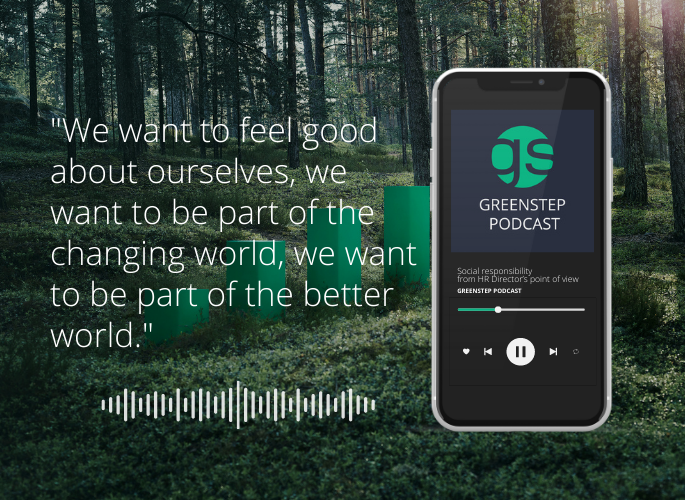Social responsibility: Company values driving a successful sustainability agenda

Social responsibility is becoming an increasingly important part of business. Various stakeholders expect companies to be responsible, and the EU Corporate Sustainability Reporting Directive (CSRD) will oblige companies to address sustainability issues. However, it is the company values that should drive the sustainability work – the desire to truly contribute to the common good and a better world.
A new season of Greenstep Podcast is all about HR topics. In the first episode of the season, Timo Leskinen, EVP of Human Resources at Vaisala, and Kati Tuovinen, Head of HR Business at Greenstep, took an in-depth look at social responsibility from an HR perspective. Vaisala, known for its sustainability work, has been selected as Finland's most sustainable company and has ranked in top 5 of Financial Times’ Climate Leaders 2022 list.
Social responsibility as part of an everyday activity of the organisation
Social responsibility topics on HR's table can include promoting diversity and equality, ensuring well-being and safety at work, and supporting employee education and training. HR can also be responsible for ensuring good governance, ethical practices and employee rights.
At Vaisala, the social responsibility issues that belong to HR include for example the mental and physical well-being of employees and safety at work. According to Leskinen, the work requires a lot of cooperation, active work, and prevention. If health or safety problems occur, corrective actions need to be taken early so that they can be tackled at the earliest possible stage. Diversity, equality, and inclusion are also key themes for which HR takes responsibility, as they often already have metrics and data on the subjects.
Leskinen emphasizes that while HR has an important role to play in implementing social responsibility, it is a matter for the whole organisation. Every member of the organisation must understand the importance of responsibility and adopt it as part of their everyday work. Business leaders need to ensure that responsibility is reflected in all activities and decision-making.
– In many of the topics HR is carrying the torch. We are looking what we could be talking, talk about the vision, and create the ambition level and a roadmap. But the execution always happens in the line organisation, Leskinen points out.
HR's metrics for social responsibility
Creating metrics and reporting on the results is essential for measuring social responsibility. According to Leskinen, Vaisala has measured social responsibility in areas such as health, well-being, diversity, equality and inclusion.
Health metrics at Vaisala include for example the sick leaves and well-being of the people, accident rates and safety observations. There is also quite a few metrics of diversity, equality and inclusion, such as gender balance in management, different nationalities in leadership roles, and diversity of nationalities in Finnish cities. Vaisala has also measured the so-called Diversity Index through employee surveys. These find out whether people feel that they are treated equally, do they feel that their opinions count, and do they feel that everyone has the same job opportunities in the organisation.
– All indicators are set with both short and long-term targets. With these we are both able to follow our process, but also be able to provide evidence within the organisation that these social responsibility issues are relevant and that things need to change, Leskinen sums up.
Reporting on sustainability issues should also be done from a legislative perspective. From 2024, a new EU directive (CSRD) will come into force, making ESG reporting mandatory for large and listed companies. The directive will oblige companies to comply with sustainability reporting standards. The change is expected to extend to smaller companies in the future.
Tuovinen points out that legislation often sets only minimum requirements that companies must at least comply with. Companies that take responsibility into account in their daily activities will often already be in a good position when the new legislation comes into force. Responsible companies strive to go beyond the legislation and continuously improve their operations.
Company values driving a sustainability agenda
Tuovinen recalls that in the early 2000s, sustainability work was done because of external motivators, such as stakeholder obligations. Nowadays, sustainability is often driven by internal motivation and company values.
– For me it's about are you doing things because you want others to think good about you, or are you doing things because you want to feel good about yourself? I think it's moving more towards, in our company, but also in other companies, that we want to feel good about ourselves, we want to be part of the changing world, we want to be part of the better world, Leskinen says.
Sustainability issues are also important for employees. People want to work in a responsible company because they want to be involved in promoting environmental well-being and a better society. In addition, a company that manages social responsibility issues offers its employees a wide range of added value. For example, diversity allows people to experience different cultures and learn new things that they might not experience in homogeneous organisations.
Tips for successful sustainability work
Leskinen shares three tips for HR professionals working with social responsibility.
- Act in accordance with ethics and morals. What is right? When making decisions, you need to consider the interests of all stakeholders, including employees, customers, the environment and society as a whole. When you act according to ethical principles, you are usually doing the right choices.
- Create KPIs. Set short and long-term targets for those.
- Things are not done by talking, but by doing. Create concrete action plans so that you know where you are going and how you are going to get there.
So, implementing social responsibility requires long-term work and a genuine desire to improve the well-being, diversity and equality of the organisation and the society. You can listen to the whole interesting discussion on Spotify!
If you need support with HR or sustainability reporting, Greenstep's expert team is always happy to help you.

Published 14.03.2023